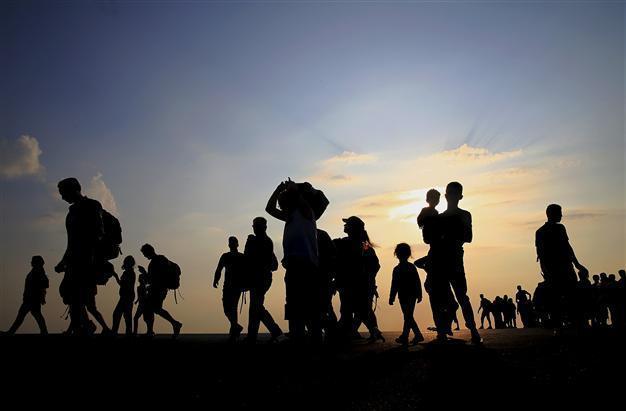Refugees reaching Greece after dangerous journey want to leave for other EU countries
Yorgo Kirbaki – ATHENS

REUTERS photo
Around 500 refugees of Afghan, Iraqi and Syrian origins sheltering in an Athens park say they have no wish to stay in Greece and are hoping to move on to greener EU pastures as soon as they acquire documents.The drama of the roughly 124,000 refugees that have struggled through the hardships of the journey to reach Greece does not end when they arrive on the country’s shores.
Mostly having made their way into Greece via an illegal and dangerous boat trip starting from Turkey, the 500 refugees staying in tents at the Pedion Areos Park, which is just 20 minutes by foot from the Greek parliament, said they wanted to go to other EU countries as they could not find jobs in Greece and did not want to be transferred to a refugee camp, where living conditions are more difficult.
The refugees staying at the park in their own tents said they did not want to go to a new refugee camp, where the infrastructure works are ongoing, in Athens’ Eleonas district, as the Greek government announced in recent weeks. The migrants said they wanted official documents to be prepared so that they can leave Greece for a different EU country, where they dream of building a better and safer life for themselves and their family.
Speaking to daily Hürriyet, an Afghan national who identified himself simply as Fehim, said they fled their country out of fear of the Taliban and came to Greece via Turkey, adding that they had been cautious to avoid swindlers in both Turkey and Greece.
Fehim, who used to be a car mechanic in Afghanistan, set sail for a Greek island from the Aegean province of Çanakkale four months ago together with his wife, mother-in-law and two sisters-in-law.
“There was storm on the [Aegean] Sea but the boat we rode was steady. If I cannot go to the Netherlands or France within a month’s time, I will run out of money,” Fehim said.
The Pedion Areos Park was turned into a camp for the migrants, where around 500 people, including women, children and elderly people of mostly Afghan origin, are currently staying. People stay in a little over 100 tents set up in the park, where there are eight portable toilets for the refugees. Women wash their clothes in basins with the water they take from fountains at the park, while the newly washed clothes hang on ropes hanging between trees.
A group of Greek volunteer doctors examine the refugees and prescribe medication at a tent in the park, while a Greek civil society organization distributes free bottled drinking water. Mobile phones are charged with illegal electricity.
Ali, 30, who fled Afghanistan three years ago for Turkey and came to Greece three months ago, said he still cannot believe he survived the boat journey from Turkey.
“It was May and the waters were not as calm as it is now. We got on a little boat with eight to 10 people from near İzmir with our life vests on us. All through the night, as I saw the waves, I was afraid of sinking every 10 meters. When we came close to an island, whose name I don’t even know, they said we should jump off the boat and swim,” Ali said. “I am still surprised how I survived.”
Some 124,000 people, almost all of them fleeing war and persecution in Syria, Afghanistan and Iraq, have come ashore in Greece since the beginning of the year – a 750 percent increase from the same period last year, the U.N. refugee agency said Aug. 7.
But when they arrive on Greece’s islands there is usually nothing for them and most are forced to sleep outdoors, relying on volunteers for food and water, Vincent Cochetel, head of the UNHCR’s Europe division, said Aug. 7.
“It’s total chaos on the islands,” he said, describing desperate, exhausted people, including women, children and unaccompanied minors, searching for food, water, shelter and information about how to proceed.
After a few days they are transferred to Athens, where again “there is nothing waiting for them,” he said.
Greece only offers reception places for 1,100 people, he revealed, “which is totally inadequate for the needs.”
Around 50,000 people arrived in July alone – 20,000 more than in June, the U.N. refugee agency said.
Greek Prime Minister Alexis Tsipras asked Europe for help, saying on Aug. 7 his cash-strapped country could not deal with them alone.
The influx has piled pressure on Greece’s services at a time when its own citizens are struggling with harsh cuts and its government is negotiating with the EU and the International Monetary Fund (IMF) for fresh loans to stave off economic collapse.
















